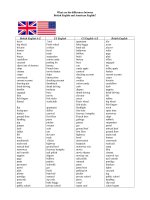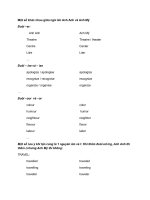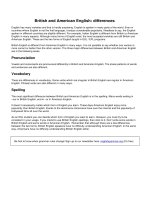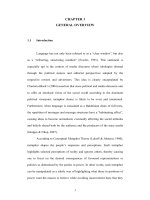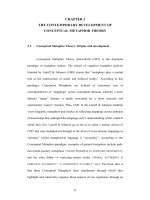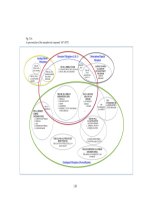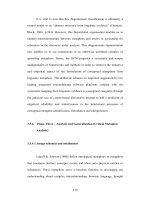British and american english differences
Bạn đang xem bản rút gọn của tài liệu. Xem và tải ngay bản đầy đủ của tài liệu tại đây (8.3 KB, 1 trang )
British and American English: differences
English has many varieties and that is hardly surprising. English is spoken in many parts of the world. Even in
countries where English is not the first language, it enjoys considerable popularity. Needless to say, the English
spoken in different countries are slightly different. For example, Indian English is different from British or American
English in many aspects. Although many forms of English exist, the most accepted varieties are still British and
American English. These are the two forms of English taught in ESL / EFL programs.
British English is different from American English in many ways. It is not possible to say whether one version is
more correct or better than the other version. The three major differences between British and American English
are in the following areas.
Pronunciation
Vowels and consonants are pronounced differently in British and American English. The stress patterns of words
and sentences are also different.
Vocabulary
There are differences in vocabulary. Some verbs which are irregular in British English are regular in American
English. Phrasal verbs are also different in many ways.
Spelling
The most significant difference between British and American English is in the spelling. Many words ending in
–our in British English, end in –or in American English.
It doesn’t necessarily matter which form of English you learn. These days American English enjoy more
popularity than British English, thanks to the dominance Americans have over the internet and the popularity of
Hollywood films all over the world.
As an ESL student you can decide which form of English you want to learn. However, you must try to be
consistent in your usage. If you intend to use British English spellings, then stick to it. Don’t write some words in
British English and some words in American English. Remember that although there are a few differences
between the two forms, British English speakers have no difficulty understanding American English. In the same
way, Americans have no difficulty understanding British English either.
Be first to know when grammar rules change! Sign up to our newsletter here: englishgrammar.org (It's free)
Powered by TCPDF (www.tcpdf.org)
